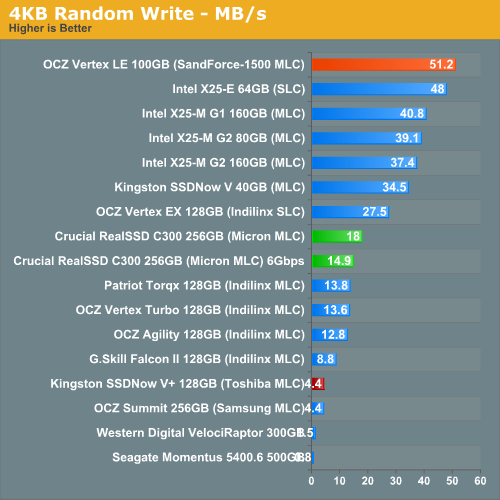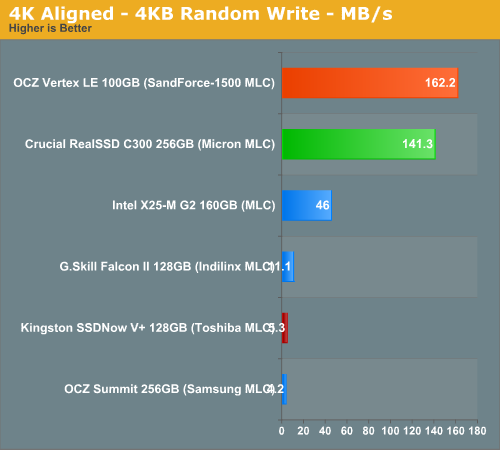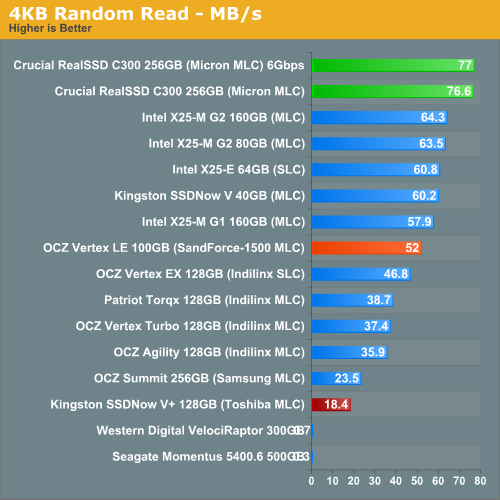OCZ’s Vertex Limited Edition Review & SSD State of the Union
by Anand Lal Shimpi on February 19, 2010 12:00 AM EST- Posted in
- Storage
Random Read/Write Speed
This test writes 4KB in a completely random pattern over an 8GB space of the drive to simulate the sort of random writes that you'd see on an OS drive (even this is more stressful than a normal desktop user would see). I perform three concurrent IOs and run the test for 3 minutes. The results reported are in average MB/s over the entire time.
I've had to run this test two different ways thanks to the way the newer controllers handle write alignment. Without a manually aligned partition, Windows XP executes writes on sector aligned boundaries while most modern OSes write with 4K alignment. Some controllers take this into account when mapping LBAs to page addresses, which generates additional overhead but makes for relatively similar performance regardless of OS/partition alignment. Other controllers skip the management overhead and just perform worse under Windows XP without partition alignment as file system writes are not automatically aligned with the SSD's internal pages.
First up is my traditional 4KB random write test, each write here is aligned to 512-byte sectors, similar to how Windows XP might write data to a drive:

The OCZ Vertex LE does ridiculously well here, outperforming even Intel's X25-E. The Crucial RealSSD C300 does ok, a bit better than the Indilinx drives but no where near as good as the Intel based offerings. The reason being that the C300's controller doesn't actually attempt to reorganize unaligned writes on the fly. Look at what happens to 4K random write performance if we only write to 4K-aligned addresses:

Not only does the Vertex LE jump in performance to over 160MB/s, but so does the RealSSD C300. The Intel and Indilinx drives also get a small boost, but nothing huge by comparison. Modern 4K-aware OSes write data in 4K aligned addresses, which matches up perfectly with the 4K page size on all of these SSDs. You can also guarantee higher performance in older OSes like Windows XP by re-mapping the LBAs on the fly but that requires additional overhead. These newer drives forgo performance under Windows XP, for significantly better performance under Windows Vista/7 and Mac OS X 10.5/6. It makes sense given that Intel's X25-M was designed back in 2005 - 2007 while these newer controllers were more recent endeavors.

Random read performance is great on the C300 but a bit lower on the Vertex LE. None of these drives are posting bad figures here though. For the price the Kingston SSDNow V+ doesn't appear to deliver its worth.










83 Comments
View All Comments
v12v12 - Tuesday, February 23, 2010 - link
YES! You tell these idiot RAID-0 fanboys that it's USELESS and doesn't offer any real world benefit for all the potential catastrophic FAILURE it can cause, and the fact that it's DOUBLE: the drive price, double the heat, double the noise, double the space required, double capacity loss... the list of negatives about RAID-0 go on and on.__ WHile nobody talks about RAID-1, like it's some redheaded-step-child. RAID-1 is the BEST thing anyone can do if they value their data. Screw a meager speed increase (very subjective/specific to the intended usage) when you risk losing it all and THEN you'll spend how many HOURS of DOWN TIME cursing your HDs to hell? Logic right out the window folks...
RAID-O has long been proven to be a complete WASTE OF TIME! Go search Xbit-labs, Storage review and the myriads of other comparisons that PROVE (again not my opinion) that it's a farce and doesn't belong on "desktop" systems at all: stupid gamers/fanboys never learn.
funkyd99 - Tuesday, February 23, 2010 - link
I wouldn't call double the capacity useless. Before you generalize everyone who uses RAID-0 as an "idiot fanboy", realize that:1. Some people need more than 160GB of storage for their primary drive, and prefer a hardware solution vs. a software solution such as dynamic disks.
2. Some people have a solid bare-bones backup solution in place, and can recover from a catastrophic failure in less than an hour.
3. RAID-1 on a desktop is the waste of time and hardly the best thing someone can do if they value their data. Please tell me how RAID-1 will save your data if a faulty power supply fries everything in your computer, or a faulty controller writes a bunch of garbage to both disks, etc. etc. An external drive and a weekly backup is safer than relying on RAID-1 as a backup solution.
4. Some people can get a point across without resorting to name-calling and CAPS.
mlambert890 - Thursday, February 25, 2010 - link
This is so well said. Why are so many people so insanely emotionally involved with disk drives, video cards, etc?There is no "final answer" discussing RAID 0. Lots of people like to declare they have a "final answer" and call anyone who dissents an "idiot", but this is just noise.
As has always been the case with *any* RAID level, cost/benefit analysis really depends almost entirely on your use case and indvidiual situation. It is tempting to try to paint with a broad brush (especially on web forums), but reality just doesnt work that way
Anyone who understands RAID, storage, or really technology in general in any meaningful way, knows this.
A lot of technology passes through my hands as a result of my profession (and a lot has come and gone during the course of a 20 year career).
Annecdotally, I can tell you right now that I absolutely "feel" the difference between Intel SSD single drive and the sames drives in RAID 0. I have the two setups sitting right here for testing. Synethetics show a difference, and the difference is measurable and noticeable. Many people say they don't notice the difference between SSD and *HDD*. They arent wrong - perception is subjective.
Objectively, however, RAID-0 yields a performance increase. Whether or not one can perceive it or feels the tradeoff is worth it (as is ALWAYS the case with RAID-0), is a subjective and individual decision.
Some day a lot of these kids are going to look back on their post history (unique thing - your words last forever on the internet) and wonder what the heck they were thinking...
kmmatney - Friday, February 19, 2010 - link
I agree. NewEgg just had the Intel 80 GB SSD on sale for $219. They sold out pretty fast, though. I think at the end of the day, you can't go wrong with Intel for an SSD. Their toolbox can schedule a anutomatic TRIM operation once a week for Windows Xp systems as well, so lack of autoatic TRIM in Window XP is not an issue.leexgx - Saturday, February 20, 2010 - link
intel toolbox will only work in AHCI mode (Sata mode as well i think but you lose NCQ) and no updated chipset drivers or no intel matrix drivers installedmschira - Friday, February 19, 2010 - link
typo gallore...
But I am so excited...
M.
micksh - Friday, February 19, 2010 - link
Vertex LE 200GB is $920 at Amazon (preorder, no availability date)http://www.amazon.com/OCZ-Technology-Limited-2-5-I...">http://www.amazon.com/OCZ-Technology-Li...-Inch-OC...
Just one note. Numbers on charts are aligned to bars and text is aligned to the left edge of the chart. If the bar is too short the numbers overlap with text and it's hard to read the numbers.
Shining Arcanine - Friday, February 19, 2010 - link
I thought Linux's ext4 and btrfs filesystems supported TRIM too. Why do you say that only Windows 7 supports TRIM?Chlorus - Sunday, February 21, 2010 - link
Because BTRFS is still experimental and EXT4 is a piece of shit that randomly corrupts large files?gwolfman - Friday, February 19, 2010 - link
Anand,I'm jealous of your serial number: 1.
OCZ showing some special love to you. :)